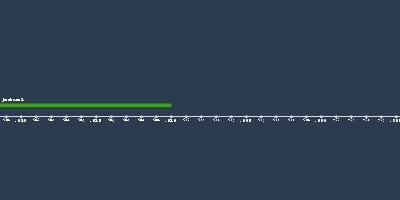Aristobulus II (31 jan 66 ano antes da era comum – 1 set 63 ano antes da era comum)
Descrição:
Aristobulus was the younger son of Alexander Jannaeus, King and High Priest, and Alexandra Salome.After the death of Alexander in 76 BCE, his widow succeeded to the rule of Judea and installed her elder son Hyrcanus II as High Priest in 73 BCE.
When Salome died in 67 BCE, Hyrcanus succeeded to the kingship as well.
Aristobulus shared his late father's views on religion and politics. He entertained designs upon the throne, even during the life of his mother.
He courted the nobles and military party by constituting himself the patron of the Sadducees and bringing their cause before the queen.
The many fortresses which the queen placed at the disposal of the Sadducees, ostensibly for their defense against the Pharisees, constituted in reality one of the preparatory moves of Aristobulus for the usurpation of the government.
The queen sought to direct his military zeal outside Judea, and sent him (70-69) against Ptolemy Mennaeus; but when the undertaking failed, Aristobulus resumed his political intrigues.
He left Jerusalem secretly and betook himself to his friends, who controlled the largest number of fortified places, with the intention of making war against his aged mother. But the queen died at the critical moment, and he immediately turned his weapons against his brother Hyrcanus, the legitimate heir to the throne.
During this civil war, the Roman general Pompey defeated the Kingdoms of Pontus and the Seleucids. He sent his deputy Marcus Aemilius Scaurus to take possession of Seleucid Syria.
As the Hasmoneans were allies of the Romans, both brothers appealed to Scaurus, each endeavoring by gifts and promises to win him over to his side. Scaurus, moved by a gift of 400 talents, decided in favor of Aristobulus and ordered Aretas to withdraw his army. During his retreat, the Nabateans (lower Jordan with Petra as capital) suffered a crushing defeat at the hands of Aristobulus.
When Pompey arrived in Syria in 63 BCE, both brothers and a third party that desired the removal of the entire dynasty, sent their delegates to Pompey, who however delayed the decision. He favoured Hyrcanus II over Aristobulus II, deeming the elder, weaker brother a more reliable ally of the Roman Empire.
Pompey defeated the Jewish armies in multiple battles, and took the fortresses of Judea. Aristobulus and his sons Alexander and Antigonus were captured in 63 BCE. Aristobulos, suspicious of Pompey, entrenched himself in the fortress of Alexandrium, but when the Romans defeated his army again, he surrendered and undertook to deliver Jerusalem over to them. However, since many of his followers were unwilling to open the gates, the Romans besieged and captured the city by force, badly damaging city and temple. Hyrcanus was restored as High Priest, but deprived of political authority.
Aristobulus II escaped in 57 BCE, instigating rebellion against Rome in Judea, until he was finally holed up by Aulus Gabinius, consul of the Roman province of Syria, in Machaerus. Marc Antony, commander of the cavalry under Gabinius, led several men to scale Aristobulus' fortifications and subdue his forces.
Taken prisoner, Aristobulus was released by Julius Caesar in 49 BCE in order to turn Judea against Pompey. He was on his way to Judaea with his son Alexander, when "he was taken off by poison given him by those of Pompey's party". His son Alexander was beheaded by the Roman commander Scipio at Antioch.
His son Antigonus led a rebellion against Rome, with help from the Parthians, and became king and high priest in 40 BCE, but was defeated and killed by the Romans in 37 BCE.
Adicionado na linha do tempo:
Data:
31 jan 66 ano antes da era comum
1 set 63 ano antes da era comum
~ 2 years and 5 months
